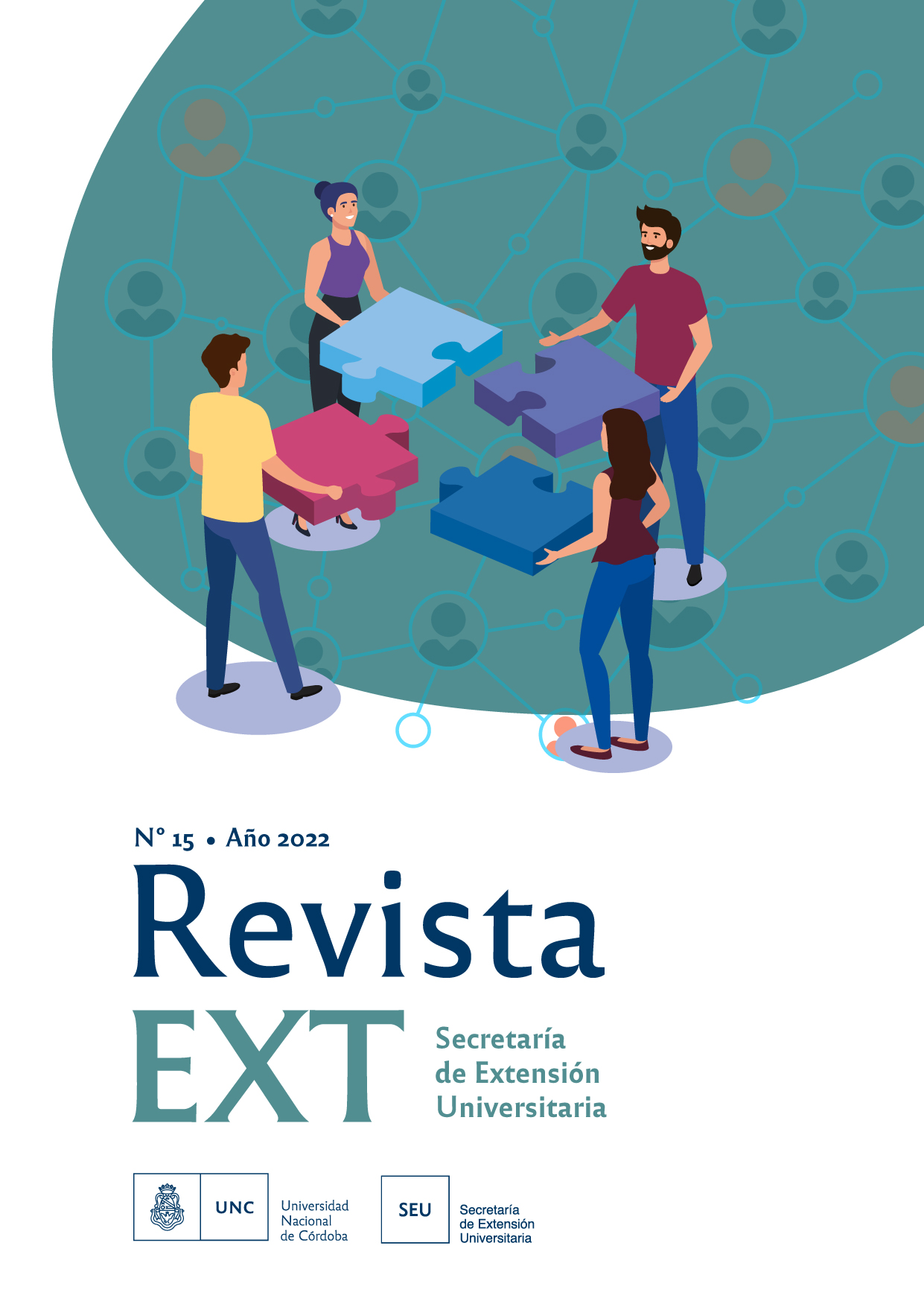Mujeres construyendo Salud
Palabras clave:
Salud Comunitaria , Prevención , Violencia de Género , Promotoras TerritorialesResumen
El presente trabajo sintetiza una experiencia de curricularización de la extensión universitaria realizada en el año 2021. Se incorporó a estudiantes de 3° año de la carrera de Psicología a un trabajo de extensión universitaria. La misma tuvo como objetivo trabajar en conjunto con una casa de atención y acompañamiento (CAAC) de Sedronar en Barrio Ampliación 1 de Julio “Somos Pueblo” en la Ciudad de Córdoba. Se trabajó en la formación de Promotoras Territoriales (PT) para la promoción y protección de la salud para la prevención de la violencia de género. Las mujeres con las que se trabajó cumplen roles claves en su comunidad, ya que su trabajo impulsa el desarrollo psicosocial y la supervivencia material de numerosas familias. En el contexto de emergencia sanitaria por el COVID-19 y por el aislamiento social, preventivo y obligatorio (ASPO) ha habido un cambio significativo en la realidad social y económica de los sectores populares. Se visibilizó la brecha existente en el acceso a la salud, la dificultad en la continuidad de la educación y más casos de violencia de género. En este sentido, trabajar en la formación de PT fue importante para desnaturalizar y sensibilizar conductas y situaciones de violencia que ponen en riesgo a la mujer. La intervención se desarrolló a través de talleres sincrónicos virtuales por la plataforma Meet y de recursos digitales como cuestionarios de Google y entrevistas. Se buscó promover el reconocimiento conjunto de los factores de riesgo y protectores de la salud vinculados a la violencia de género, así como su desnaturalización, generando espacios de reflexión respecto a procesos de salud-enfermedad-cuidado, y visibilización de situaciones de desigualdad y exclusión estructural.
Descargas
Referencias
Dávila, A. (2014). "Área de la Psicología Sanitaria". Apunte de Cátedra Psicología Sanitaria, Facultad de Psicología, Universidad Nacional de Córdoba.
Gallegos, M. (2016). Una cartografía de las ideas de la complejidad en América Latina: la difusión de Edgar Morin. Latinoamérica. Revista de estudios latinoamericanos Online. N.63, pp.93-128. ISSN 2448-6914.
Ministerio de las Mujeres, Géneros y Diversidad (2020). Comunicaciones a la línea 144. Datos públicos disponibles en https://www.argentina.gob.ar/generos/linea-144/datos-publicos-de-la-linea-144-ano-2020
Montero, M (1984). La psicología comunitaria: orígenes, principios y fundamentos teóricos Revista Latinoamericana de Psicología, vol. 16, núm. 3. Konrad Lorenz Bogotá, Colombia.
Solar, O., & Irwin, A. (2010). A Conceptual Framework for Action on the Social Determinants of Health. Social Determinants of Health Discussion Paper 2 (Policy and Practice). Geneva. https://doi.org/ISBN 978 92 4 150085 2
Remón (2000) Promoción de la salud y cambio social. Elsevier España.
Rovere, M. (1999) Redes En Salud; Un Nuevo Paradigma para el abordaje de las organizaciones y la comunidad, Rosario: Ed. Secretaría de Salud Pública/AMR, Instituto Lazarte
Ruiz Bravo, P. (1999). “Una aproximación al concepto género”. En. Sobre género, derecho y discriminación. Defensoría del Pueblo. Lima: PUCP, pp.131-150.
Zaldúa, G, Sopransi, M, B. Dispositivo taller: Modalidad de construcción de saberes y prácticas autogestivas en salud. Anuario de Investigaciones, vol. XIII, 2006, pp. 249-258 Universidad de Buenos Aires Buenos Aires, Argentina.
Descargas
Publicado
Número
Sección
Licencia

Esta obra está bajo una licencia internacional Creative Commons Atribución-NoComercial-CompartirIgual 4.0.
Aquellos autores/as que tengan publicaciones con esta revista, aceptan los términos siguientes:
- Los autores/as conservarán sus derechos de autor y garantizarán a la revista el derecho de primera publicación de su obra, el cuál estará simultáneamente sujeto a la Licencia de reconocimiento de Creative Commons que permite a terceros compartir la obra siempre que se indique su autor y su primera publicación esta revista.
- Los autores/as podrán adoptar otros acuerdos de licencia no exclusiva de distribución de la versión de la obra publicada (p. ej.: depositarla en un archivo telemático institucional o publicarla en un volumen monográfico) siempre que se indique la publicación inicial en esta revista.
- Se permite y recomienda a los autores/as difundir su obra a través de Internet (p. ej.: en archivos telemáticos institucionales o en su página web) después del proceso de publicación, lo cual puede producir intercambios interesantes y aumentar las citas de la obra publicada. (Véase El efecto del acceso abierto).





